What is a grand piano? Well, it’s that big kind of piano that’s longer than it is tall. Why are they so popular? Should you buy one? These are questions that shoppers should address before buying their new piano.
If you are a music lover, a pianist, or a parent of a budding musician, you may have wondered which type of piano is best to purchase for your home.
When it comes to choosing a piano, there are a few different types to consider: a digital piano or an acoustic piano, of which there are grands and uprights.
Each has its own unique features and benefits, but here, we’ll focus on the reasons why someone might choose to buy a grand over the other options.
What is a Grand Piano?
A grand piano is a large, acoustic piano with strings that are arranged horizontally.
They come in a variety of sizes, ranging from a petite/baby grand (under 5’5”) to a concert grand (9’+). (Note: This is the measurement from the keys to the back of the piano.)
Size makes a huge difference in playing experience! Read our article on how baby grands compare to grand pianos!
Grands are typically made of high-quality materials and are considered the gold standard in piano performance, so they’re usually the go-to choice for performances and recitals.
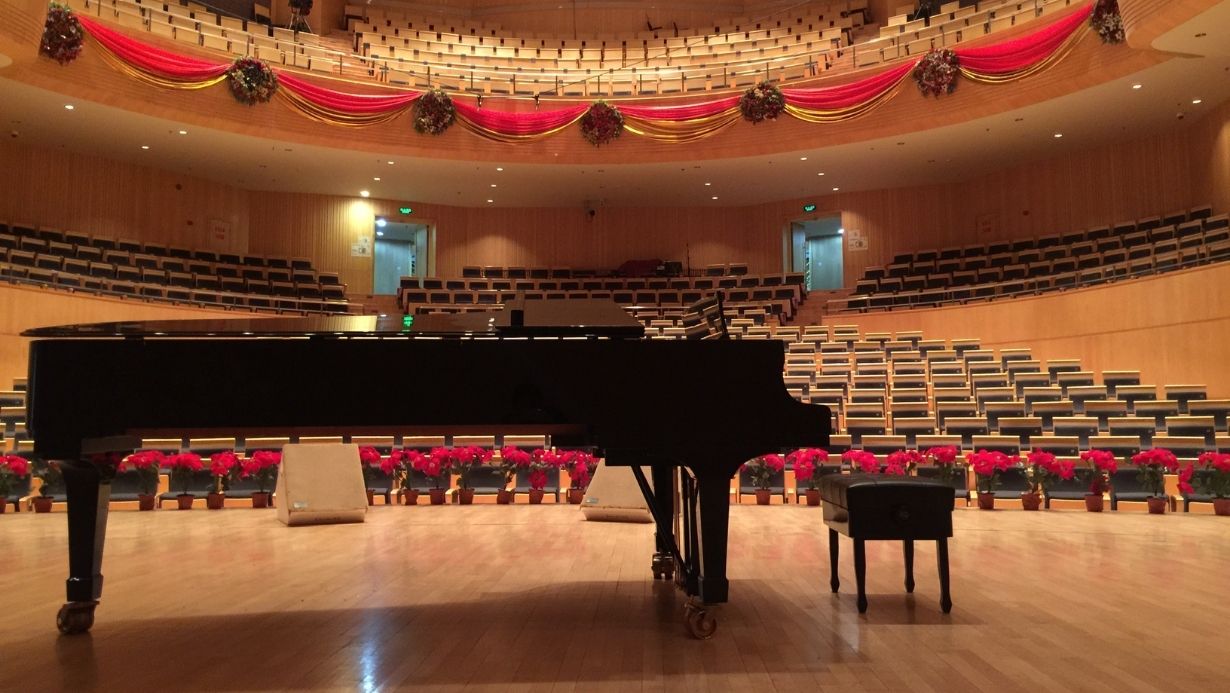
A concert grand piano is at home in a concert hall! A smaller grand wouldn't fill the room as well, and any other piano would just be. . . kinda inappropriate for the situation.
What Are The Benefits of Grand Pianos?
But why are they so popular for performances? And why exactly would someone choose to buy a grand piano for their home over an upright or digital piano? Here are a few key reasons broken down:
Superior Sound Quality
One of the most significant advantages of a grand piano is its superior sound quality. In general, they have a richer and more dynamic tone compared to other pianos.
There are three main reasons for this:
- Sound comes out the top and bottom of grand pianos. The strings and soundboard are arranged horizontally, and the sound waves are thus able to resonate more freely. The sound player and the audience are encompassed by the sound more directly compared to an upright piano, and it makes a huge difference acoustically.
- Grand pianos typically have larger soundboards than upright pianos, which allows for more sound projection and sustain. While there are tall uprights with soundboards and strings larger than baby grands, that tends to be the exception rather than the norm.
- Grand pianos typically have longer strings than upright pianos. A piano’s overall volume and dynamic range comes primarily from its string length (as well as from the action which is also improved in grand pianos). The volume and dynamic range of a piano becomes very important as players improve; advanced pieces require pianists to go from very soft to very loud, and that’s easier on grands.
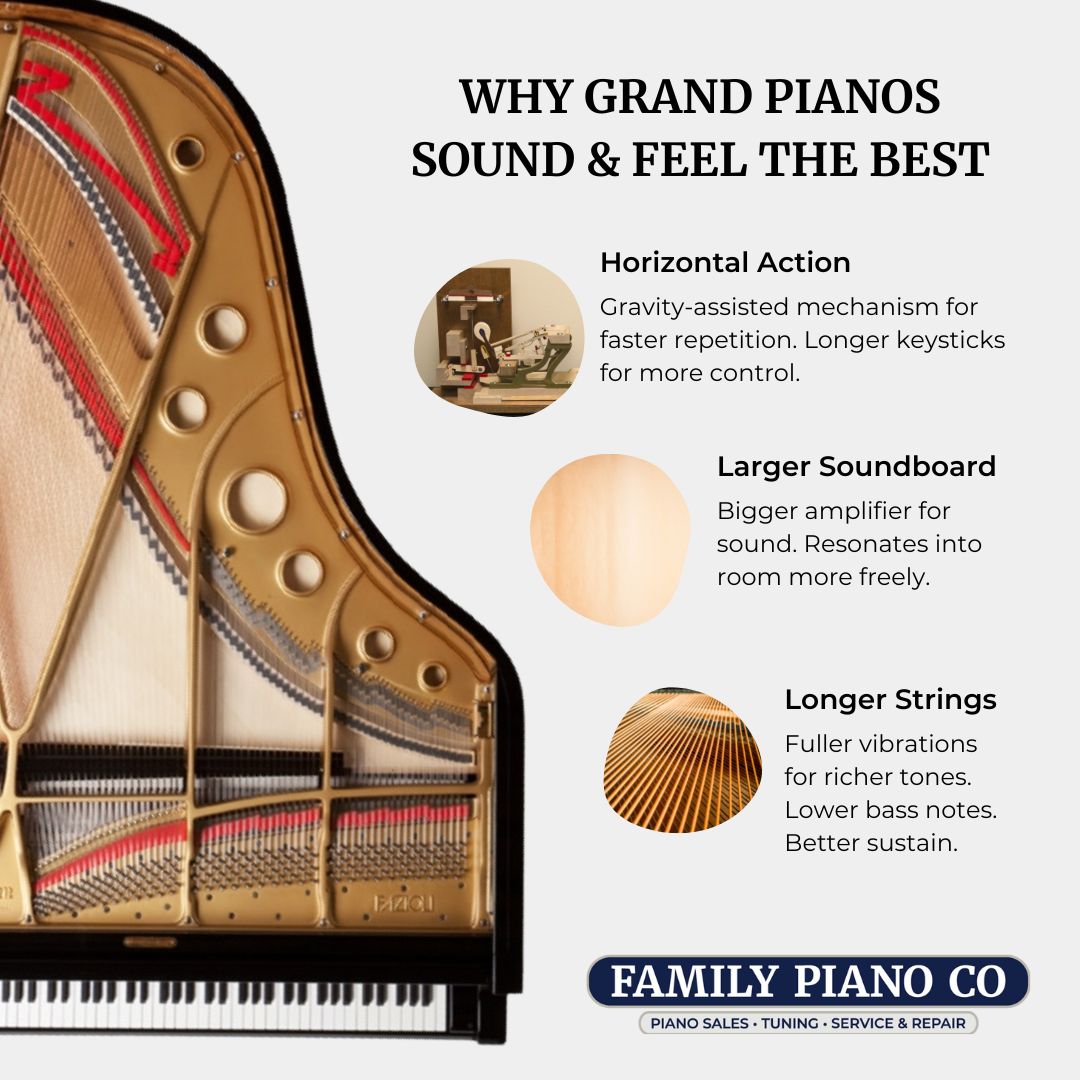
In a nutshell, here's why grand pianos sound and feel so good!
All these factors combine to create a sound that is unmatched by any other type of piano. If you’re looking for the best sound possible, you’re looking for a grand piano.
Better Touch and Responsiveness
Grand pianos have a more perceptive action that is typically faster and more responsive than that of an upright or digital piano.
As mentioned, their strings are strung horizontally. Not only does that improve sound, but it also allows space for a larger action capable of more nuanced and expressive playing. This becomes especially important as pianists play more advanced pieces.
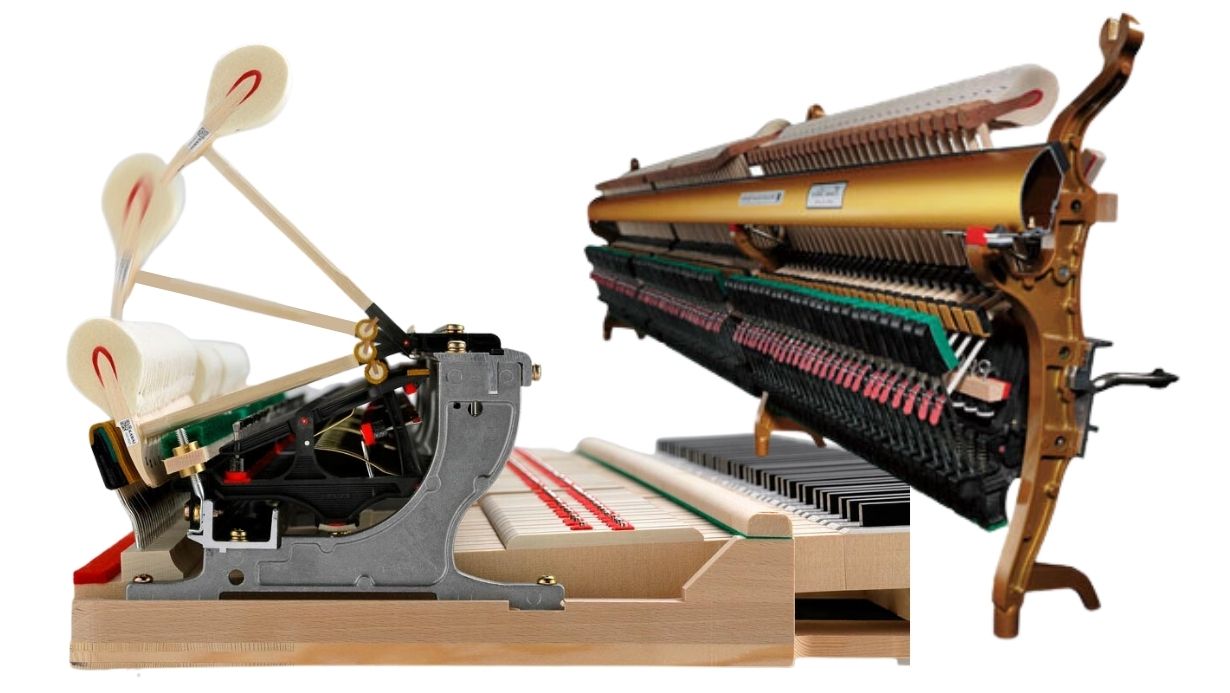
A grand piano has a horizontal action (left) which is assisted by gravity. Upright pianos have vertical actions (right) which require extra mechanisms to work.
It’s worth noting that the upright piano was invented out of the need for a compromise in space. Its entire existence is meant to mimic a grand piano. In order to accommodate a smaller size, the strings, keysticks, and other mechanisms on upright pianos are smaller and shorter. Shorter keysticks and a more compact action make for a less responsive keyboard.
The compromises in upright pianos aren’t deal breaking or anything, but they do present limitations for pianists with advanced repertoires. All things equal, a grand piano is likely to be the better choice compared to upright or digital pianos.
Aesthetics
Let’s face it: grand pianos are stunningly beautiful instruments.
They are often considered to be gorgeous pieces of furniture in their own right, with their sleek wooden finishes and elegant shape.
A grand can, and usually does, become the centerpiece of a room, adding an air of sophistication and elegance to any space.
With a wide selection of styles and finishes, you can easily find the perfect piano to complement your space.
Durability
While any piano is a long-term investment, a high-quality grand piano can provide a lifetime of enjoyment. In fact, when taken care of, acoustic pianos can last 75–125 years!
Acoustic pianos require tuning at least yearly, as well as occasional technician work and minor repairs. More care must be taken to protect acoustic pianos from temperature and humidity changes, and they must be placed in a stable environment for optimal health.
Where you put your piano impacts its longevity. Make sure to read our tips for piano placement!
Compared to upright pianos, grand pianos get the best in terms of parts and craftsmanship. For this reason, we’d argue that the average grand piano will last longer than the average upright piano.
In either case, any acoustic piano will outlast a digital piano. Part of this is due to the technology in digital pianos advancing so rapidly that even a 10-year-old keyboard seems ancient. Meanwhile, a piano from the 1920s has fundamentally the same features as a 2020s piano. Not to mention, an acoustic piano can be rebuilt and given additional decades of life!
Most people only buy one acoustic piano in their lifetime, and it often even becomes a family heirloom of sorts. It goes to say: take care of your grand piano, and it will take care of you.
Performance Opportunities
Finally, a grand piano is necessary for serious performance opportunities, such as concerts or competitions.
The pianos at recitals and similar events are basically always grand pianos. We even know of piano students who don’t have one at home but will seek one out to practice on for their performance.
The sound and touch of a grands are necessary for advanced repertoire and nuanced expression, making it the only choice for serious pianists. Having one as a beginner will definitely set you up for success too.
Does a Grand Piano Have Any Disadvantages?
There are many variables that go into what makes a perfect piano for you and your family.
For those who are serious about their piano playing and want the best possible instrument, a grand piano is often the ideal choice.
However, while there are many advantages to owning a grand piano, there are also some obstacles to consider. These may include:
Size and Space
Most people are concerned about size when they decide to buy a grand piano.
Grand pianos are large and can take up a significant amount of space in a room. They also require a large, open area to be played effectively.
On the contrary, when our salespeople do home visits, we find that people tend to underestimate the “amount” of piano that can fit in their space. For this reason, we have paper templates available so you can check the size a piano would take up in your space for yourself.
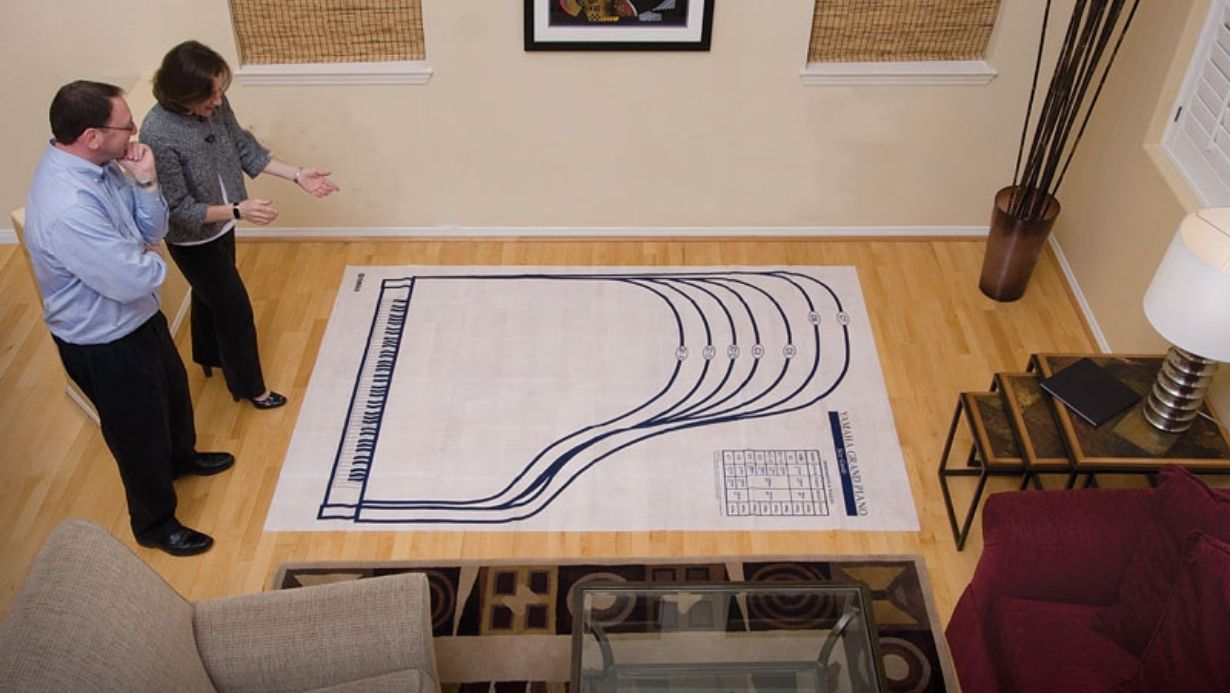
Not sure how big a grand you can fit in your home? Ask your dealer for a floor template!
Cost
Most of the time, grand pianos are more expensive than upright pianos.
The larger size, more intricate action, and higher quality materials used in the construction of a grand piano all contribute to its higher cost. Plus you have to consider the cost of transporting the instrument around the world, and the cost of maintaining and displaying it on a showroom floor.
A piano’s price ultimately depends on its quality, age, size, and brand. For example, a brand new, luxury brand upright piano will definitely cost more than a smaller, more worn-in grand piano.
If your dream piano is a grand, there are ways to find something within your budget! There’s no way to avoid that a grand piano is typically a pricey investment. Still, we think with enough planning and saving, it’s one that’ll pay itself off in many ways.
Maintenance
Acoustic pianos require consistent tuning and maintenance of its inner-mechanisms, which can add up over time.
That said, this is true no matter the type of acoustic piano. Upright pianos will also require at least yearly tunings and check-ins. You can think of these as oil changes for your car; you definitely don’t want to skip them and risk more costly repairs later on.
The only way to completely avoid maintenance costs would be to opt for a digital piano instead. However, you should also consider the benefit of durability we covered earlier. Acoustic pianos do require upkeep, but they also last much longer than most digital pianos!
Should Everyone Buy a Grand Piano?
Grand pianos are long-term investments that can last a lifetime, become a treasured family heirloom, and will fill your space with an authentic, lively sound that a digital instrument simply cannot match.
Furthermore, grands are the gold standard for the most important parts of piano playing – the sound and the feel. If you want the very best in tone and touch, there’s simply no beating a grand piano.
That said, choosing between a grand, upright and digital piano ultimately depends on your individual needs and preferences.
We think that if you’ve got room in your budget and home for a grand piano, that’s the ideal choice. But if space or budget are limiting factors, then an upright or digital piano can be a great choice too!
The quantity, quality, affordability, and diversity of pianos available today is greater than at any other point in the entire history of music. So at the end of the day, the best piano for your home is the one you and your family will love to play.

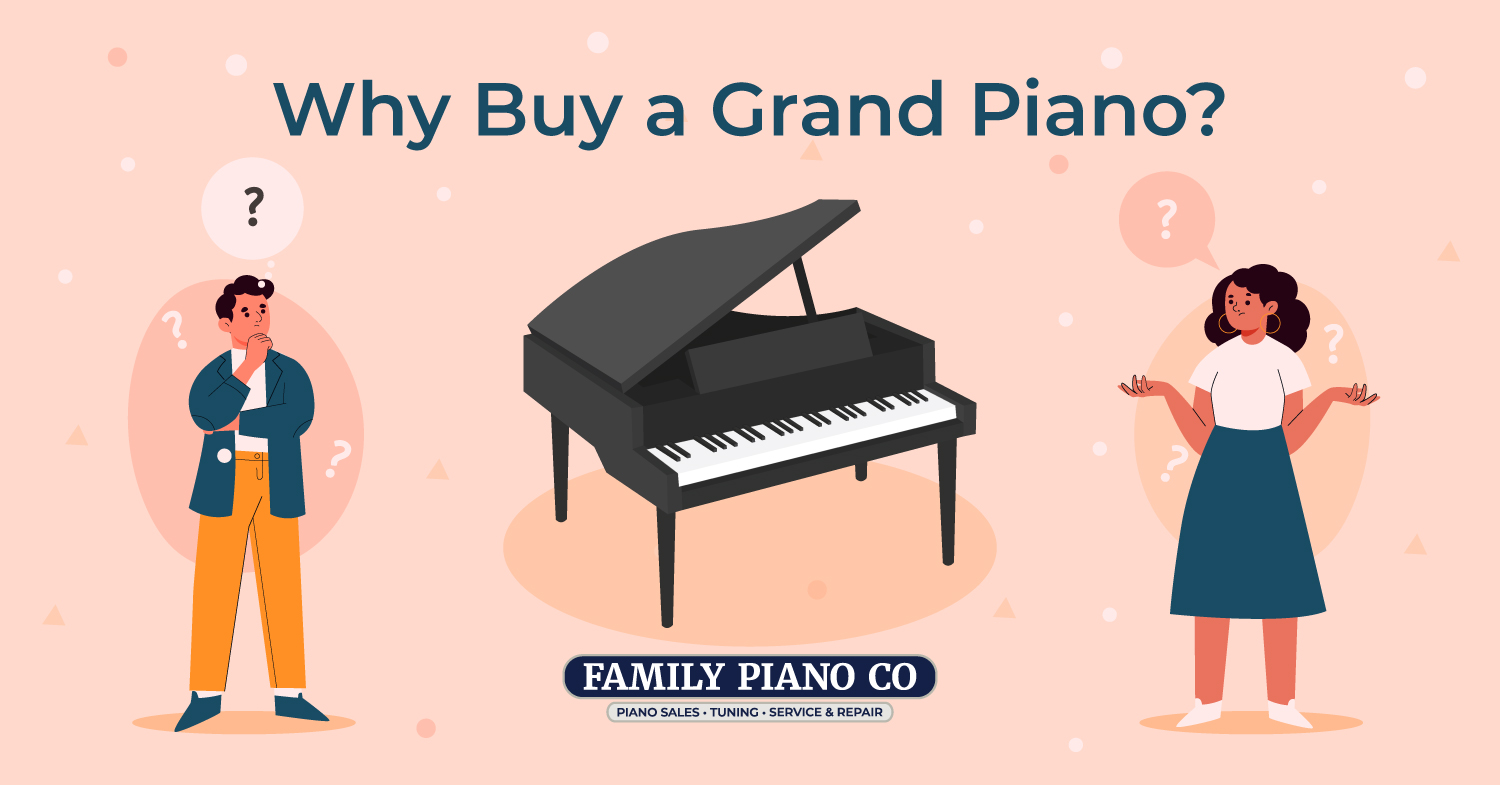

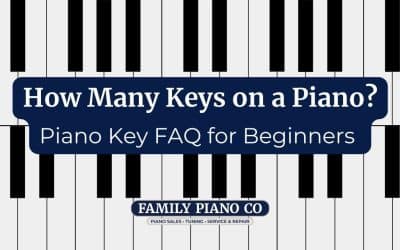

0 Comments